Eric Reid is on a mission
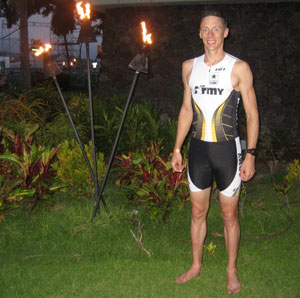
Eric Reid is fairly new to triathlon and will go back to Kona for the second time. But the Army Major and Battalion Executive Officer isn't just looking for a new personal record in Kona, he is raising money for the Wounded Warriors foundation.
Slowtwitch: How did you get inspired to raise money and how did you pick the charity?
Eric: A lot of things factored in to wanting to raise money for Wounded Warriors this year… it was a series of events over a couple of years. Honestly it was Jordan Rapp's campaign on ST for World Bicycle Relief that got me thinking about it. I was racing Ironman Arizona as well, thought it was a great cause, as well as impressed by the slowtwitch forum response and right before I headed out I sent in my donation. Coincidentally while in Tempe strolling around the Expo I overheard somebody talking to a crowd of people about an Army Major and so I stopped to eavesdrop. Turns out it was triathlon icon and CAF co-founder and board vice-president Bob Babbitt talking to a group of people about Operation Rebound and a few of the prominent athletes that OR supported. He was also telling everyone about Rudy Garcia-Tolson who came so close to finishing the Hawaii Ironman and was giving it another try at IM AZ. He would go on to finish… very inspiring to watch. Mr. Babbitt gave me his card and I was struck by the passion he had for CAF in general but specifically the efforts of helping Wounded Warriors in particular. Also factoring in was wearing the Army triathlon uniform at races…. In 2008 I was lucky enough to be selected as one of three male athletes to represent the Army in a competition against the other services. That experience really opened my eyes to the military component of triathlon in general as well as the many Wounded Warrior athletes that competed in Hawaii and other places. Since 2008 I've worn the uniform at most of my races and am always amazed at the support I receive, but am humbled by my fellow Warriors who have been wounded in combat that compete or otherwise. You would not believe how much of a lift it is at mile 20 of an IM run leg to hear a "Go Army!" Since then I have begun to realize not only the effect of wearing my Army tri-top but how many people out there that have helped me to get to where I am personally, professionally, and athletically and so the seed to give something back began to grow. Finally, my experience at the California 70.3 in Oceanside cemented the idea. As you know Oceanside is right outside Camp Pendleton Marine Corps base. We've all competed with athletes with various injuries and disabilities, but the number of challenged athletes racing that day and the extent of their injuries was absolutely stunning. I was inspired and decided that if I qualified I would attempt to raise awareness and money for Wounded Warriors through Operation Rebound.
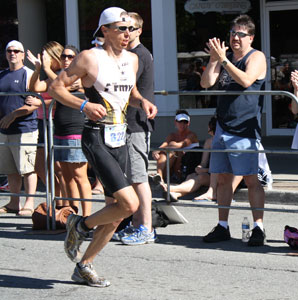
ST: Was there anyone particularly who inspired you?
Eric: There was one girl, headed out to start the run as I was just finishing. She had one leg completely amputated all the way up to her hip socket, but otherwise looked like any other athlete… very fit… and I assumed she was a Marine or Soldier. She was getting a lot of support from the crowd… lots of "you got this" and "you can do it" and "don't quit." Right then I knew, just by seeing the look on her face, that while nice to hear, none of those things had even crossed her mind. She was an athlete, and she was there to compete, plain and simple. She stood at the same start line, raced on the same course, and even said the same things to herself that any other athlete (including World Champion Michael Ralaert who was there that day) would say to themselves during a pre-race ritual: I am going to go as fast as I can, I will not slow down, I am going to crush this race. And that's the beauty of triathlon… we all race on the same course at the same time. We all have goals that drive us that are personal and relative, whether it's winning the world championship, setting a personal best, or going farther than we previously thought possible. But in the end we are all competitors.
Very compelling are the similarities between warriors and athletes… not quitting, accomplishing the mission, showing up on game day to crush. Some of us are Capital W Warrior-athletes, and some of us are small w Capital A warrior-Athletes. Despite the different uniforms it's no surprise the number of top Age Groupers that are military, the number of Wounded Warriors who gravitate towards triathlon, or how many top Age Groupers that I have met in person who are leaders in business or in their communities that would make great leaders in the military… lots of similar traits.
ST: How are you going about your fundraising effort?
Eric: I'm really excited to be fund raising and raising awareness for our Wounded Warriors. I'm using social media like Facebook and other internet resources to get the word out as well as leveraging my friends and family to spread the word. I am so grateful to Slowtwitch in this regard, thanks Herbert! Over the years I've met a lot of athletes in the Army and military in general so I am also reaching back to them for help spreading the word as well. This is one of the reasons I set my goals high… I'm just one person but with the help of the internet and so many people out there who have been touched or inspired by challenged athletes I know I can make my goal.
ST: Have you been on any Wounded Warrior rides yet?
Eric: I have not been on any rides yet, but did meet some of the athletes from Operation Rebound at the Kansas 70.3 in June. We shared a VIP tent and I got to meet them, hear their backgrounds, and generally trade stories about the race and the course that day. It was an awesome and sobering experience.
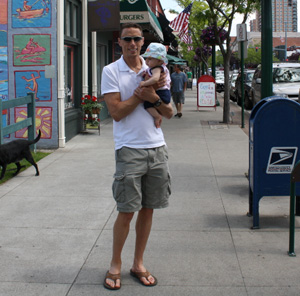
ST: What are you doing in the army?
Eric: Right now I am the Executive Officer for a Support Battalion in an Infantry Brigade Combat Team in the 4th Infantry Division at Fort Carson, Colorado. Our job is to provide all the logistics support our Team might need to allow them to accomplish the mission, everything from maintenance support, medical support, distribution of supplies and equipment, food, water, etc. We're essentially the Ironman Volunteers of the battlefield, doing amazing things behind the scenes to make things go off as smoothly as possible. As an Army Logistician I've had some interesting jobs over the years, everything from a truck platoon at the lower levels to planning and coordinating the big picture stuff like how to move large amounts of supplies and equipment long distances via over the ocean shipping, ports, and rail, for example. Being in the Army has been a great opportunity to meet a lot of interesting people, get exposed to new ideas and activities, as well as challenge myself professionally and see the world.
ST: From what we understand, you have been doing triathlons for only a few years now.
Eric: My first race was an Olympic at Bonelli Park in SoCal in 2006. I nearly drowned, swore I would never do this ever again in T1, but by halfway through the bike leg I was hooked. 2nd race was another Olympic in South Korea where I was then stationed, and my third was Ironman New Zealand. I was lucky to find a great group of military and ex-pat friends and training partners in Korea who were all experienced athletes and through them I was able to discover a hidden talent for aerobic endurance which eventually led to qualifying for Kona in 2008. With their help and mentorship I was able to improve in a short time.
ST: So how did your first Ironman Hawaii go?
Eric: I had high expectations going in. 2008 was a break-through year for me after qualifying with a roll-down at Eagleman in June and going sub-10 at IM Japan for the first time two weeks later. Unfortunately things did not go as planned, perhaps due to stomach issues before the race, and I finished in 10:44 or so. I learned a lesson in perseverance that day, as well as the fickleness of Ironman, but more importantly I came to appreciate the experience as a whole instead of being totally focused on myself in the moment. The Hawaii Ironman experience was everything I had hoped for and more… Kona is such a special place and all through the Ironman week I felt like I was walking on hallowed ground. To be there, in that place and at that time, was a special moment. Of course I had seen the Ironman on TV as a kid, and after starting the sport and seeing a training partner head off to the race every October I knew I had to go. The race played out in the classic sense as well… hitting all the "landmarks" so to speak. Media buzz, Dig Me Beach, and pro sightings during the week; morning nerves approaching the swim start and pinching myself that I was there; surviving the mosh pit, rounding the famous catamaran at the turnaround, seeing the scuba/camera guys underneath us; the infamous Kona winds, the helicopters, and the photographers on motorbikes on the bike (especially descending from Hawi); and the amazing crowds as well as heat on the run. All the things I had seen on TV as a kid or heard about from the Hawaii veterans I knew, all the highs and lows I was expecting. It took me 10 miles in to the run to accept the fact that I wasn't going to be able to do as well as I had hoped, but once I did it was an incredible 16 miles back to Ali'i Drive where I took everything in really appreciated the moment I was sharing with all the other athletes. I left Hawaii intent on getting back there the next year.
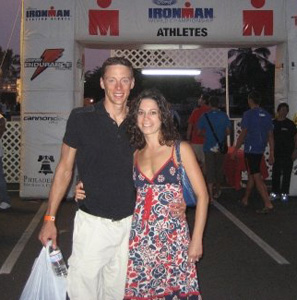
ST: We know you did not race in Kona the next year. So what happened and where did you qualify this time?
Eric: For 2010 I qualified at IM CdA, 7th AG, 34th OV and 9:43xx. I had unfinished business this year at CdA… in 2009 I came in to CdA bent on re-qualifying and going to Kona to have the race I had hoped for in 2008. I was lucky to get a roll-down on the 100 degree day at Eagleman and I so I wanted to qualify on my own. I was sure I would qualify, had a good train-up, good race, and I finished in 9:53. Most years would have been good for a slot but in 2009 it was only good for 10th AG…. we had 8 slots that year and while everyone I talked to told me it would roll down, the top 8 guys all took their slot and I was left standing at the roll down in shock. I only missed by 50 seconds. I was pretty crushed (but not as crushed as the guy who missed by 1 second though), and so I registered for the following year on the spot. Anyway, I realized you can NEVER count on a Kona slot, no matter who you are, not to mention realizing that I was NOT that guy anyway. I went back to the drawing board and had a good rest of the 2009 season and a pretty good 2010 season leading up to CdA, training smart and keeping my expectations in check.
Flash forward a year… IM CdA 2010 was a great day and I was well prepared. It was nearly an epic day until stomach issues nearly shut me down on the run. Sudden and horrible vomiting, cramping, and dehydration. You can imagine the terror I experienced at that moment: after two years of work and a well executed race I was 8 miles to the finish line and slowed to a walk. I agonized about having great legs going to waste. I started doing the math on numbers of slots, where I stood in my AG, "50 seconds" running through my mind, etc. Finally I said to myself it doesn't matter, just do what you have to do to finish. After that it was a typical Ironman run recovery story, nothing heroic or special, just OODA and keep moving forward. I made a plan (ironically one that I had rehearsed believe it or not), got the wheels back on, took in the fluids and salts that I needed and focused. I made it to the next aid station, and then the next, and the next, and eventually I crossed the line. You can not imagine the relief I felt at qualifying (or rather, not dropping out of a slot) and the excitement of racing at the front of the Amateur pack all day. My wife and new baby daughter were there at the line and I was SO thrilled to be sharing that moment with them instead of lamenting over what might have been.
ST: Will your family come with you to Kona?
Eric: Yes, my family is coming to Kona! I couldn't have done any of the things I've done without my wife Mandy, not only in her supporting/tolerating my training but in her patience and love over the years, seeing something in me that I didn't see myself. She was the one who encouraged me to get my old self back, so she's the one to credit/blame for my current triathlon obsession. She keeps telling me that these races are not real vacations, but I wouldn't go without her! I'm also very excited to hold my new baby daughter Chloe at the finish line on Ali'i drive. I'm sure that image will keep me going when things get tough on race day.
Ed.: You can support Eric Reid's efforts for the Wounded Warriors on the CAF Wounded Warriors Eric Reid site



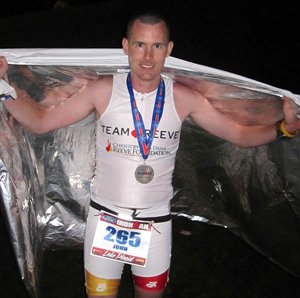
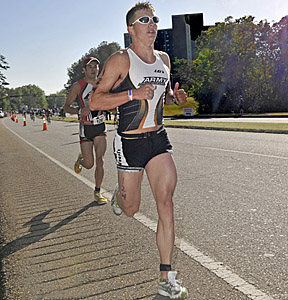

Start the discussion at forum.slowtwitch.com